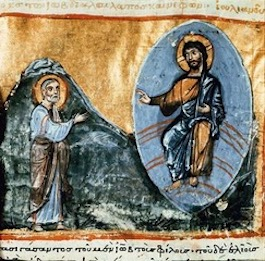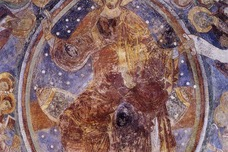Sunday Reflection with Canon Robin Gibbons - September 4th 2022

Twenty Third Sunday in Ordinary Time
There is a phrase in the Letter of James that strikes me as a wonderful summation of what Jesus is asking of us in today's Gospel from Luke 14. Because translations are always fraught with difficulties, we must try and look both at context and the wider meaning of things, which is why for me, this sentence from James means a lot: "My brothers and sisters, show no partiality as you adhere to the faith in our glorious Lord Jesus Christ". (Jas 2:1)
There is something in that word partiality that opens out a gentler approach to the three very hard sayings of Jesus about discipleship we read today!
In most contexts to be partial to something, or to receive or benefit from somebody's partiality towards us means a favourable bias rather than anything negative. But it is at least partly exclusive, for being partial also means we are less disposed towards others or towards other things.
Luke puts before us three hard sayings of Jesus that we have to deal with. There is no way out of it, and that is something we need to grapple with. The first is this :"If any one comes to me without hating his father* and mother, wife and children, brothers and sisters, and even his own life, he cannot be my disciple". (Lk 14:26)
What does this mean? Well it cannot mean hate as we know it, for the Gospel is full of Jesus showing love, care and concern to families and friends. His mother appears with him in several scenes, so he does not cut her out of his life and he restores those who are sick or dead to those who love them. Partiality helps, because it reminds us that the whole issue is about context, firstly Jesus asks if we are 'willing', if anyone comes to him, no one is compelled or ordered.
Secondly it is not a statement that is meant to be adversarial, it is about our priorities, we are being asked to show partiality towards Jesus, we still honour, love and care for others but we are called to fix our eyes, soul, mind and heart first on Christ and His Kingdom. Our love, our relationships will be the deeper and stronger for that, because they are rooted in the very source of love and forgiveness.
The second invitation needs to be understood in terms of discipleship; "Whoever does not carry his own cross and come after me cannot be my disciple". (Lk 14 :27) Luke warns us who are the would-be followers of Christ that our journey through life will always be marked by the sign of the cross. It goes back to our willingness to take up Christ's invitation, for to carry one's own cross is to follow Jesus and do as he did, live a life of free self-giving, taking on that humility of a death to oneself. Following Jesus means that partiality again, when faced with a definite choice, which will you choose? In other words are we willing to take up the cross as it comes to us in that moment? It is hard because it requires from us a deliberate and willing choice of direction; will Christ be our compass, our guide, our destination or not? Are the causes he enjoins on us the ones we choose, especially important in this day and age of stark realities about environment, caring for living creatures, eradicating poverty, dealing with cause and effect of war ? Commitment to Christ means taking up our cross daily, having that partiality for the cause of Christ. Only if you willingly take up your cross may you be called His disciple (Lk 14:27)
But what of our third call by Jesus? "In the same way, everyone of you who does not renounce all his possessions cannot be my disciple" (Lk 14:33) Let's think about uses of that word renounce, in a formal legal way it means giving up, rejecting, abdicating use or position, but it can mean we renounce in order to be free. Religious men and women by a vow of poverty renounce possession of goods, but that does not mean they have none, it is how they use them, how they are shared and more importantly cared for that matters. It is again that word partial, we hold things lightly whilst appreciating them greatly. What I think, and I hope others do as well, is that these commands to come and follow Christ are really counsels not so much of indifference to relationships and property, but to ground them in the partiality of Love. That Love is also the cross we share with Christ!
Lectio Divina
Basil of Caesarea
Letter 42
Here our Saviour Himself was crucified for our sakes that by His death He might give us life, and train and attract us all to endurance. To Him I press on, and to the Father and to the Holy Spirit. I strive to be found true, judging myself unworthy of this world's goods. And yet not I because of the world, but the world because of me. Think of all these things in your heart; follow them with zeal; fight, as you have been commanded, for the truth to the death. For Christ was made obedient even unto death. (Philippians 2:8) The Apostle says, Take heed lest there be in any of you an evil heart...in departing from the living God. But exhort one another...and edify one another (1 Thessalonians 5:11) while it is called today.( Hebrews 3:12-13 ) Today means the whole time of our life. Thus living, brother and sister, you will save yourself, you will make me glad, and you will glorify God from everlasting to everlasting. Amen.
From a Homily of Pope Francis
Tuesday 6 March 2014
It is "the journey of humility, and of humiliation, of self-emptying". For "the Christian way of life without the cross is not in fact Christian" and "if the cross is a cross without Jesus, it is not Christian".
Taking on a Christian way of life therefore means "taking up one's cross with Jesus and going forward". Christ himself has shown us this way by emptying himself. Although he was in the form of God, he did not boast, he did not consider himself "a good that could not be renounced, but rather he emptied himself" and became "a servant to us all".
This is the way of life that "will save us, give us joy and make us fruitful. For this journey of self-denial is undertaken in order to give life: it is the opposite of the journey of egoism ... which leads to one becoming attached to goods for one's own sake". The Christian way is "open to others, for it is the same journey that Jesus has made". It is a journey "of self-emptying for the sake of giving life".
"The Christian way is precisely this way of humility, of meekness, of gentleness. Whoever wishes to save his life will lose it. Jesus repeats this idea elsewhere in the Gospel. Remember when he speaks about the grain of wheat: unless the grain dies, it does bear much fruit (cf Jn 12:24)".


















